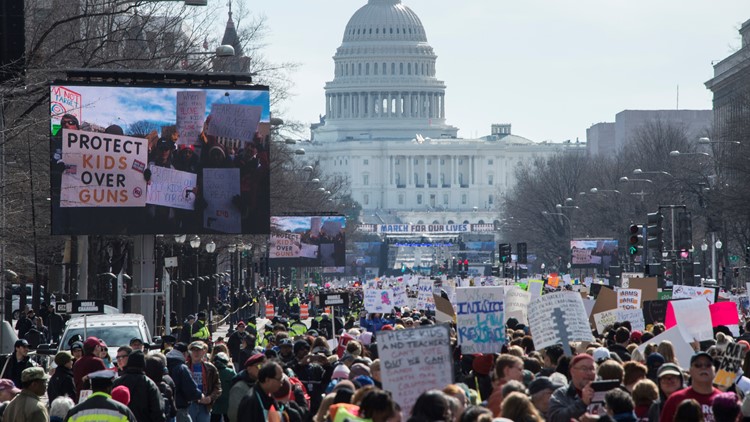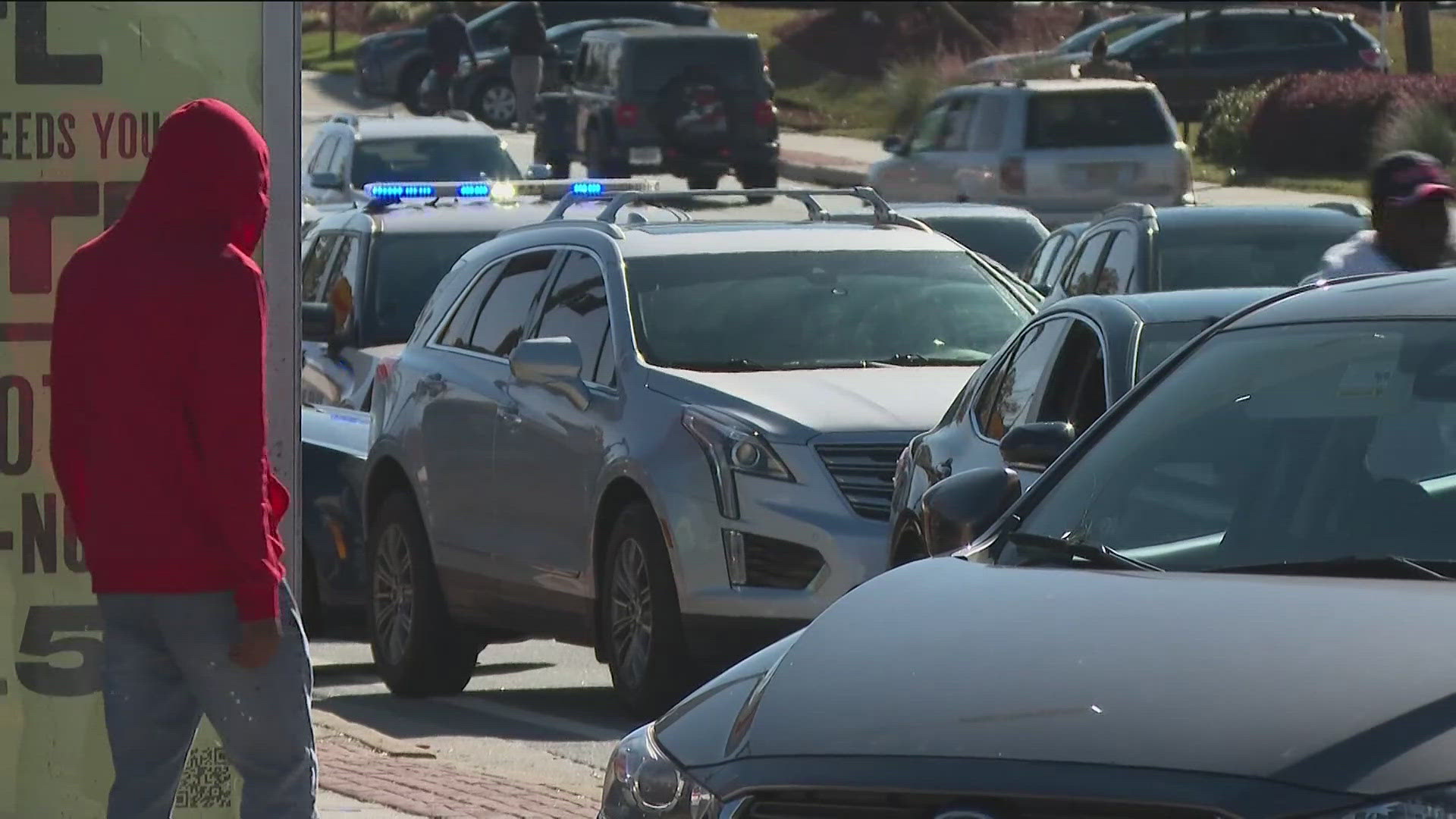They walked out of classes. They rallied in streets across the nation for the March for Our Lives in powerful ways. They have the attention of millions. Now what?
The student-led movement forged in Parkland, Fla., after the high school shooting that took 17 lives is remarkable, organized and fierce — but not completely rare. Endless lists of groups have protested, marched, rallied, cried and pleaded for changes, whether it’s been for gun laws, immigration, women’s reproductive rights or climate change.
Now the question is whether these young people who dub themselves “the mass shooting generation” will fade into the background of the debate over gun-control or be the leading charge in changing the country's policies.
Many of the Parkland students at the march in Washington on Saturday made it clear one of the next revolutions would be at the polls.
"We are going to make this the voting issue," said David Hogg, a Stoneman Douglas student and organizer of the march. "We are going to take this to every election, to every state, and every city. We are going to make sure the best people get in our elections to run not as politicians, but as Americans."
Still, it won't be easy to blaze the trail. Experts and leaders of past movements say it’s going to be an uphill battle to translate the #NeverAgain movement into significant changes. A lot will revolve around local efforts, keeping pressure on lawmakers and having a clear message moving forward.
Jaclyn Corin, one of the core members of the group, says she knows it will be difficult and called for the massive crowds in Washington D.C. on Saturday to vote. She and the other student speakers shared stories of surviving gun violence and seeing it rip apart their communities and families.
They each vowed to continue fighting. Corin told USA TODAY they aren’t “backing down.” She said their successes thus far have been astonishing and they're committed to finishing what they started.
“Our target is the November elections and we know we definitely have to keep pushing forward to then,” she said. “This whole thing has taken off into a much bigger thing. We are starting a non-profit and want to continue to advocate for gun-control, reforms and voter education.”
Focusing on elections and being “relentless” was a part of what made previous gun-control measures happen, said Richard Aborn, a former president of the Brady Center, which advocates gun control.
In the 1990s, Aborn worked to successfully advocate for the federal assault weapons ban and the Brady Bill, which created a waiting period for some gun purchases and the establishment of a federal background checks system.
He said back then getting support from either political party was difficult, and the National Rifle Association was still the Goliath it is today. Over the years, the NRA has successfully slowed and dismantled gun-control efforts it said would hurt the Second Amendment and gun owners across the U.S.
The group filed a lawsuit in Florida shortly after the state passed a sweeping bill after the Parkland shooting. It included gun-control measures, including increasing the age to 21 to purchase firearms.
The NRA said the move violated the constitutional rights of millions of 18- to 20-year olds and called it “political eye-wash.”
Aborn says the Parkland students are resilient and have grit, noting that the group has all the elements of a successful movement. But, he says, they must remain focused on the local level and the cities where members of Congress are from, which can help thrust the issue into the spotlight of this year’s elections.
He said while the march in D.C. will capture headlines, it's local effort that could lead to meaningful change. He added one of the keys will be making gun control a vote-changing issue for Americans and the younger generation. Only then, he said, will there be sweeping changes on policies.
“What happens with movements like this is you get great peaks of enthusiasm, then it dissipates,” he said. “You have to keep up the pressure and also keep things active at the local level with very specific goals, then you have to publicize all the wins, whether it’s a key vote or successful efforts in a small town.”
Many in the crowd Saturday, said they knew the march wouldn’t be enough.
Joyce Hylton, a retired high school teacher, came with her college roommate and husband. She said she’s watched gun violence continue to rip apart the country for decades and “couldn’t just stand back anymore and wait for someone” to push for changes.
She said she’s planning to vote and said, looking at the hundreds of thousands packed along Pennsylvania Avenue on Saturday, they will be, too.
“It’s time for all us to take responsibility and make sure these shootings stop,” she said, adding she hopes the momentum from this rally will keep them on course for the November election.
The momentum and keeping track of small wins help keep up spirits because it's going to be a long and tough road before there are key shifts in the gun-control debate, said Meira Levinson, a Harvard University education professor who focuses on youth empowerment and civic education.
She added the Parkland students seem to have a really good shot at a sustained campaign because the children are diverse and joining forces with others, minorities in cities that have been heavily affected by gun violence.
"Everyone can recognize themselves in these kids, and that is really crossing boundaries," Levinson said.
While some movements don't stand the test of time, others have proved prevalent over the years. The Black Lives Matter movement was started after George Zimmerman, a neighborhood watchman, shot and killed 17-year-old Trayvon Martin, who was unarmed, in 2012.
The group has continued to fight against racial inequality and call for justice after the deaths of unarmed black men over the years, notably with massive protests after the deaths of Freddie Gray, Eric Garner and Michael Brown.
The group continues to make headlines and held large protests in Sacramento, Calif., this week after officers shot and killed an unarmed black man in his grandparents' backyard. The protests caught nationwide attention and delayed a Sacramento Kings basketball game on Thursday.
Parkland teens have voiced their support for the Black Lives Matter movement and also met with students in Chicago, a city plagued by gun violence for years. Parkland students say they all want the same thing: an end to gun violence.
The #NeverAgain organizers also have worked with the Women's March organization, which held rallies around the world to protest President Trump's first day in office.
Women's March organizers said after the march in 2017, which drew millions, they were faced with a lot of decisions and had to ask themselves whether this was just a march or something they were committed to making into a bigger movement.
Bob Bland, a co-president for the organization, said they quickly realized this could be a “golden opportunity.” The group helped coordinate with local groups and provided tool kits and goals to help them successfully organize around issues affecting communities across the U.S., something that could be useful for the Florida students.
Bland said they used the energy from the first march and created a list of 10 actions over the first 100 days of the Trump administration, which included members organizing a post-card writing campaign to senators and additional protests.
They decided against solely focusing on issues like reproductive rights and targeted immigration, climate change and racial inequality. The organization’s youth arm helped coordinate nationwide walkouts earlier this month in coordination with the #NeverAgain movement.
There were issues, though, as some women differed on where they wanted the movement to go and instead wanted to focus on women winning elections.
“When you’re dealing with a mass movement and people are organizing in millions, not everyone is going to agree,” Bland said, adding there were plenty of issues while trying to start their campaign.
She said while the students in Parkland can learn from other movements and others who have successfully created societal changes, “a lot of us adults are being inspired by them.”
“They should continue to play at their strengths and not try to be like the others before them,” Bland said. “These students have something really special and are leaders unlike what we’ve seen for decades.”
Follow Christal Hayes on Twitter: Journo_Christal.



